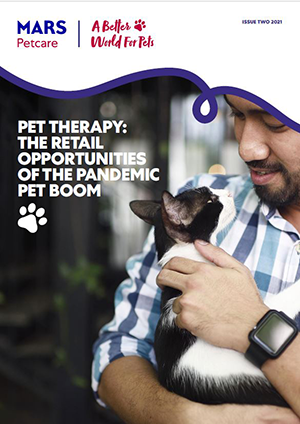
A lockdown-driven boom in the UK pet population is creating huge opportunities for retailers that can meet the increasingly exacting needs of a new generation of pet parents.
Research by Mars Petcare has revealed that the new generation of owners are likely to view themselves as much more than merely ‘owners’ of pets. The proportion of pet owners who say their animals are like children to them almost doubled between 2016 and 2020, while the proportion who view their pets as family members but not children fell significantly.
The research also revealed that the number of dogs and cats in the UK surged by 7% year-on-year in 2020 as Brits sought the mental health benefits and companionship of pet ownership during lockdown. That’s a rise of more than 1.5 million pets.
As revealed in Mars Petcare’s second annual petcare category report, Pet therapy: The retail opportunities of the pandemic pet boom, the surge in pet ownership is being driven by young urbanites, with 55% of new pet owners living in cities and a third aged under 40.
This group is more likely to favour pedigree breeds of dogs and cats and has a particular penchant for smaller ‘toy’ dog breeds. The number of shih tzus, daschunds, pugs and chihuahuas living in the UK surged by 141%, or 74,000 animals, between 2016 and 2020.
The number of pedigree cats in the country has also surged, with the British Shorthair (Britain’s most popular purebred cat) population surging by 25.4% to 1.1 million animals between 2016 and 2020. The number of Persian cats in Britain has more than tripled and Bengals are up 71%.
Zoe Taphouse, category and market activation director at Mars Petcare UK, said: “Unprecedented growth in pet ownership and the shifting demographics of ownership are driving huge demand for specialist products that cater for animals’ specific needs and build closer bonds between owners and pets.
“The new generation of pet parents are spending more money on products that give animals optimum nutrition for the life stage they’re at. They’re giving pet food as much consideration as the food they eat themselves, and trends in human food & drink are being reflected in the category.”
Total sales of pet food and litter have surged by 10.8%, a staggering rise worth £45m. This is being driven by rocketing demand for pet food and treats formulated with natural ingredients and based on the diets of animals in the wild.
Mars Petcare’s Crave brand is a perfect example of this, with sales of its Protein Strips, Chunks and Chews dog treats up 257.2% to £3.1m in the past year. That makes Crave, which contains high animal protein levels and zero artificial ingredients or grains, the UK’s fastest-growing dog treat.
To unlock further value from growing demand for natural pet nutrition and Britain’s growing population of smaller dogs, Mars Petcare launched the Natural Goodness range under the Cesar brand, the UK’s bestseller in premium wet dog food, in July.
With Brits turning to four-legged friends for comfort during the turmoil of the pandemic, the number of puppies living in the UK almost tripled between 2016 and 2020. By the end of last year, there were 1.8 million puppies in the country.
The greater number of puppies and kittens in the country, combined with the fact that smaller breeds of dog tend to live considerably longer than larger breeds, means petcare category growth is likely to be sustained in the long term, adds Taphouse. “The prospects for the category are extremely good,” she says.
“Not only do shoppers tend to shop petcare for considerably longer than other categories such as infant care, they also show a far greater propensity to trade up and try new things. With the right ranges and in-store marketing, our retail partners can look forward to a long period of growth.”


